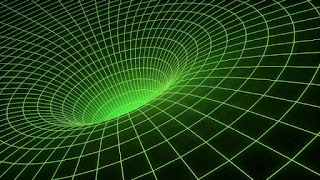Does the Future Exist?
Unusually, this isn’t a comment on climate change and the impending doom of humanity - I suspect at least a couple of us will scrape through. No, it’s about how when I type “a future” into one of Google's docs, it suggests I change it to “the future”. Has autocorrect finally become sentient and it's trying to tell me something?
Spelling I can live with. Attempting to alter my fundamental beliefs about the nature of reality feels like overreach.
As a science fiction writer whose books are set in a world that's supposed to be realistic, this is clearly something that interests me. My last book was set in three different time periods and it occurred to me I might want to do some mucking around the past and future, but could I? Would it break my rule that you can't bend the laws of physics?
Fate
When we talk about the future, there’s an implication it’s an actual thing. In fact, whether there’s a defined fate in store for us or not is a fundamental physical and philosophical question.
The modern scientific consensus on the issue seems to be “there is no fate but that we make” but consensus isn’t always right and, ironically, it sounds like this new Google general AI has a different opinion. Maybe we should all breathe a sigh of relief.
Is Anything Random?
“God doesn’t play dice with the universe” - Albert Einstein.
Einstein couldn't believe that randomness was at the heart of the laws of physics. He was convinced there must always be underlying rules that controlled everything that happened - even if we hadn’t found them yet.
He, and the classical physicists before him, reckoned any apparent randomness was down to how complicated the universe was and how subject to the famous “princess and the pea” principle (extreme sensitivity to conditions). Events were just so impossible to wrap your head around, they looked random.
Quantum theory, which was kicked off by Einstein’s own photoelectric theory, however, proposed the opposite: that almost everything, at a fundamental level, really was just chance. An interaction might happen - say a photon getting absorbed by an atom - or it might not. It wasn’t predictable, except statistically because, d'uh, it was random.
Nowadays, most physicists have signed up to quantum theory. As far as they and cryptography researchers can tell, fundamental interactions are truly random. QT has even started delivering some nice shiny gadgets: quantum computers and quantum RNGs. Does that mean Einstein was wrong?
Is the Universe a Machine For Calculating Its Own Future?
Einstein was convinced there were rules governing everything that happened, but those rules combined together with such mind boggling complexity that the result was unpredictable by humans. The upshot was there was a fixed “future”, which could only be discovered by letting events play out.
The same concept features in “Hitchhiker's Guide to the Galaxy” - that our world is a kind of computer. It’s also similar to the experience of Dr Manhattan in “The Watchmen” comics. Alan Moore suggested the fate of an omniscient god in a reality like that wasn’t great. You got so sick of the inevitability of it all that you moved to a moon of Jupiter, which was not exactly an up and coming location. As any Christmas cracker will tell you - terrible for parties.
On the QT
Quantum physicists, however, completely disagreed with Einstein and Dr Manhattan. QT reckoned true randomness underpinned everything and there was no destiny - there was an almost infinite set of possible futures, which only resolved themselves when the present arrived. So, who was right?
Is Quantum Theory Wrong?
Yes. Almost certainly. There has never been a physics theory that we haven’t improved on and quantum theory is full of issues and holes. It defies belief that it’s the one theory to rule them all.
It seems impossible to imagine we won’t eventually find some fiendish logic underpinning why photon waveforms collapse when they do and we’ll prove it isn’t random at all. I bet it shows up as some nagging unexplained issue in quantum computing.
Then The Universe is Deterministic?
Not necessarily. Even if QT as currently defined is wrong, there could still be random effects somewhere in the system and as long as there’s one, the singular future is off. And don’t say that source is free will because there’s tons of evidence free will is completely about post justification. Next you’ll be telling me a coin toss is random.
In the Panopticon series, I’ve written about one possible future. I’d be surprised if it’s the one we get, maybe it’ll share some stuff, but there’s one thing that I, quantum theory, and classical physics all agree on - we won’t know what the future will look like until we get there.


.jpg)

Comments
Post a Comment